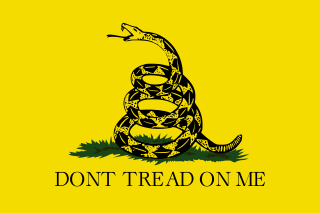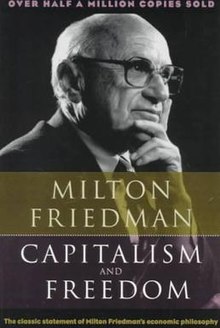Classical liberalism is a political tradition and a branch of liberalism that advocates free market and laissez-faire economics and civil liberties under the rule of law, with special emphasis on individual autonomy, limited government, economic freedom, political freedom and freedom of speech. Classical liberalism, contrary to liberal branches like social liberalism, looks more negatively on social policies, taxation and the state involvement in the lives of individuals, and it advocates deregulation.

Free to Choose: A Personal Statement is a 1980 book by economists Milton and Rose D. Friedman, accompanied by a ten-part series broadcast on public television, that advocates free market principles. It was primarily a response to an earlier landmark book and television series The Age of Uncertainty, by the noted economist John Kenneth Galbraith.
In economics, a free market is an economic system in which the prices of goods and services are determined by supply and demand expressed by sellers and buyers. Such markets, as modeled, operate without the intervention of government or any other external authority. Proponents of the free market as a normative ideal contrast it with a regulated market, in which a government intervenes in supply and demand by means of various methods such as taxes or regulations. In an idealized free market economy, prices for goods and services are set solely by the bids and offers of the participants.

Milton Friedman was an American economist and statistician who received the 1976 Nobel Memorial Prize in Economic Sciences for his research on consumption analysis, monetary history and theory and the complexity of stabilization policy. With George Stigler, Friedman was among the intellectual leaders of the Chicago school of economics, a neoclassical school of economic thought associated with the work of the faculty at the University of Chicago that rejected Keynesianism in favor of monetarism until the mid-1970s, when it turned to new classical macroeconomics heavily based on the concept of rational expectations. Several students, young professors and academics who were recruited or mentored by Friedman at Chicago went on to become leading economists, including Gary Becker, Robert Fogel, and Robert Lucas Jr.
Laissez-faire is a type of economic system in which transactions between private groups of people are free from any form of economic interventionism. As a system of thought, laissez-faire rests on the following axioms: "the individual is the basic unit in society, i.e., the standard of measurement in social calculus; the individual has a natural right to freedom; and the physical order of nature is a harmonious and self-regulating system." The original phrase was laissez faire, laissez passer, with the second part meaning "let (things) pass". It is generally attributed to Vincent de Gournay.
Libertarian theories of law build upon classical liberal and individualist doctrines.
New Right is a term for various right-wing political groups or policies in different countries during different periods. One prominent usage was to describe the emergence of certain Eastern European parties after the collapse of the Soviet Union. In the United States, the Second New Right campaigned against abortion, homosexuality, the Equal Rights Amendment (ERA), the Panama Canal Treaty, affirmative action, and most forms of taxation.
Economic freedom, or economic liberty, is reflected in the agency of people to make social/economic decisions. This is a term used in economic and policy debates as well as in the philosophy of economics. One approach to economic freedom comes from the liberal tradition emphasizing free markets, free trade, and private property, property rights being a basic human right under the Universal Declaration of Human Rights article 17 "Everyone has the right to own property alone as well as in association with others", rights that can only be fully exercised in a free and open economy. Another approach to economic freedom extends the welfare economics study of individual choice, with greater economic freedom coming from a larger set of possible choices. Other conceptions of economic freedom include freedom from want and the freedom to engage in collective bargaining.
Centre-right politics lean to the right of the political spectrum, but are closer to the centre. Parties of the centre-right generally support liberal democracy, capitalism, the market economy, private property rights, and a modest welfare state. They support conservatism and economic liberalism and oppose socialism and communism.
The Anglo-Saxon model is a regulated market-based economic model that emerged in the 1970s based on the Chicago school of economics, spearheaded in the 1980s in the United States by the economics of then President Ronald Reagan, and reinforced in the United Kingdom by then Prime Minister Margaret Thatcher. However, its origins are said to date to the 18th century in the United Kingdom and the ideas of the classical economist Adam Smith.
Economic progressivism or fiscalprogressivism is a political and economic philosophy incorporating the socioeconomic principles of social democrats and political progressives. These views are often rooted in the concept of social justice and have the goal of improving the human condition through government regulation, social protections and the maintenance of public goods. It is not to be confused with the more general idea of progress in relation to economic growth.
Left-libertarianism, also known as left-wing libertarianism, or social libertarianism, is a political philosophy and type of libertarianism that stresses both individual freedom and social equality. Left-libertarianism represents several related yet distinct approaches to political and social theory. Its classical usage refers to anti-authoritarian varieties of left-wing politics such as anarchism, especially social anarchism, communalism, and libertarian Marxism, collectively termed libertarian socialism. A portion of the left wing of the green movement, including adherents of Murray Bookchin's social ecology, are also generally considered left-libertarian.

In the United States, libertarianism is a political philosophy promoting individual liberty. According to common meanings of conservatism and liberalism in the United States, libertarianism has been described as conservative on economic issues and liberal on personal freedom, often associated with a foreign policy of non-interventionism. Broadly, there are four principal traditions within libertarianism, namely the libertarianism that developed in the mid-20th century out of the revival tradition of classical liberalism in the United States after liberalism associated with the New Deal; the libertarianism developed in the 1950s by anarcho-capitalist author Murray Rothbard, who based it on the anti-New Deal Old Right and 19th-century libertarianism and American individualist anarchists such as Benjamin Tucker and Lysander Spooner while rejecting the labor theory of value in favor of Austrian School economics and the subjective theory of value; the libertarianism developed in the 1970s by Robert Nozick and founded in American and European classical liberal traditions; and the libertarianism associated with the Libertarian Party, which was founded in 1971, including politicians such as David Nolan and Ron Paul.
Right-libertarianism, also known as libertarian capitalism, or right-wing libertarianism, is a libertarian political philosophy that supports capitalist property rights and defends market distribution of natural resources and private property. The term right-libertarianism is used to distinguish this class of views on the nature of property and capital from left-libertarianism, a type of libertarianism that combines self-ownership with an egalitarian approach to property and income. In contrast to socialist libertarianism, right-libertarianism supports free-market capitalism. Like most forms of libertarianism, it supports civil liberties, especially natural law, negative rights, the non-aggression principle, and a major reversal of the modern welfare state.
The following is a list of works by the prominent American economist Milton Friedman.

In economics, a negative income tax (NIT) is a system which reverses the direction in which tax is paid for incomes below a certain level; in other words, earners above that level pay money to the state while earners below it receive money, as shown by the blue arrows in the diagram. NIT was proposed by Juliet Rhys-Williams while working on the Beveridge Report in the early 1940s and popularized by Milton Friedman in the 1960s as a system in which the state makes payments to the poor when their income falls below a threshold, while taxing them on income above that threshold. Together with Friedman, supporters of NIT also included James Tobin, Joseph A. Pechman, and Peter M. Mieszkowski, Jim Gray and even then-President Richard Nixon, who suggested implementation of modified NIT in his Family Assistance Plan. After the increase in popularity of NIT, an experiment sponsored by the US government was conducted between 1968 and 1982 on effects of NIT on labour supply, income, and substitution effects.
Economic liberalism is a political and economic ideology that supports a market economy based on individualism and private property in the means of production. Adam Smith is considered one of the primary initial writers on economic liberalism, and his writing is generally regarded as representing the economic expression of 19th-century liberalism up until the Great Depression and rise of Keynesianism in the 20th century. Historically, economic liberalism arose in response to feudalism and mercantilism.

The modern welfare state has been criticized on economic and moral grounds from all ends of the political spectrum. Many have argued that the provision of tax-funded services or transfer payments reduces the incentive for workers to seek employment, thereby reducing the need to work, reducing the rewards of work and exacerbating poverty. On the other hand, socialists typically criticize the welfare state as championed by social democrats as an attempt to legitimize and strengthen the capitalist economic system which conflicts with the socialist goal of replacing capitalism with a socialist economic system.
Benjamin A. Rogge was an American economist, college administrator, and libertarian writer, speaker and foundation advisor. Rogge received an A.B. degree from Hastings College and an M.A. from the University of Nebraska–Lincoln. Rogge received his PhD in economics from Northwestern. At Wabash College, Rogge taught in the summer Institute for Professional Development, in addition to his usual teaching in economics. Rogge co-authored an economics principles textbook with John Van Sickle. One strength of the text is the account that it gives of Joseph Schumpeter's process of creative destruction. Rogge helped organize a series of lectures by Milton Friedman at Wabash that were eventually developed into Friedman's Capitalism and Freedom book. Much later, Rogge participated in a brainstorming session for Friedman's Free to Choose television series. Liberty Fund was founded with money from Pierre Goodrich, who sought advice from Rogge during the Fund's early years. Rogge served for many years as a Liberty Fund trustee. Thomas Sowell gives Rogge credit for encouraging him to write a book on economics and race. Rogge also was a frequent presenter at the seminars of the Foundation for Economic Education (FEE). FEE's founder, Leonard Read, thought of Rogge as Read's eventual successor, an outcome prevented by Read outliving Rogge. An extended video clip of a Rogge FEE lecture on "Competition and Monopoly" on YouTube illustrates the dry wit that made him a popular speaker. Rogge attended 13 meetings of the influential international Mont Pelerin Society. Rogge helped produce, and narrated, a documentary on Adam Smith that was funded by Liberty Fund. Rogge wrote the introduction to a collection of quotations from Adam Smith. A collection of Rogge's speeches, often on topics in economics or education, was published under the title Can Capitalism Survive? Wabash College, where he taught for many years, named a lounge on the first floor of their academic building housing the economics department the Rogge Lounge in his honor. In addition, Wabash established and named a speaker series after Rogge to pay homage to his many contributions to university students and free market economics. Rogge's archives are mainly housed at the Hoover Institute on the campus of Stanford University. A posthumous collection of Rogge's speeches and essays has appeared under the title A Maverick's Defense of Freedom.
Neoclassical liberalism is a tradition of the liberal thought that, with the premises of John Locke's classical liberalism applied to industrialized societies, opposes the welfare state and left-leaning social liberalism. In the United States, the Arizona School liberalism co-opted the term neoclassical liberal to promote some ideas of Chicago School economist Milton Friedman, such as the school voucher system and the negative income tax.





